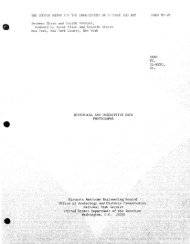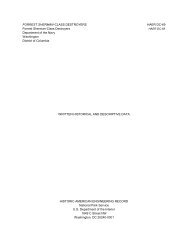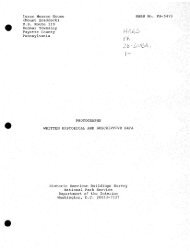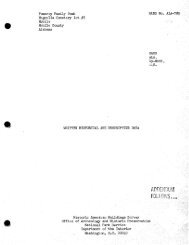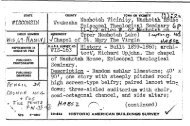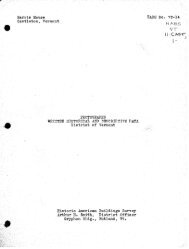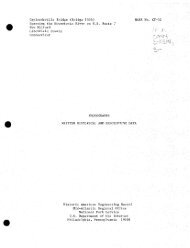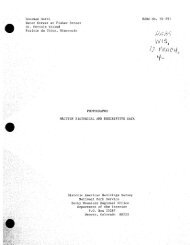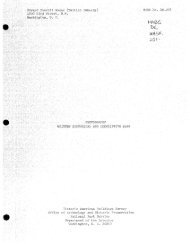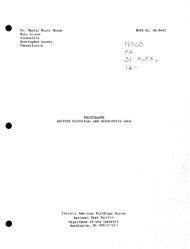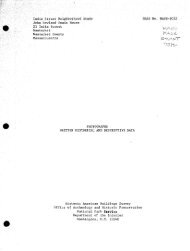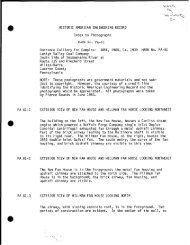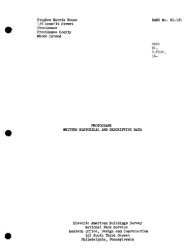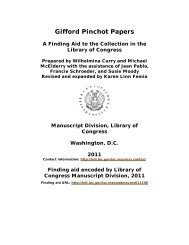- Page 1: CIVIL WAR MANUSCRIPTS
- Page 4 and 5: ' • ' " - " • • • - ' - ' -
- Page 8 and 9: Eventually, this task was placed in
- Page 10 and 11: established as a branch of the Army
- Page 12 and 13: of Gen. William T. Sherman and Gen.
- Page 14 and 15: long winter encampments, from plowe
- Page 17 and 18: HOW TO USE THIS GUIDE Library of Co
- Page 19: Many of the collections listed in t
- Page 22 and 23: Defenses of Washington, 1865. Geogr
- Page 24 and 25: Includes a copy of the draft of Wil
- Page 26 and 27: 16 Alvord, Augustus V. (1834-1904)
- Page 28 and 29: Robert Anderson
- Page 30 and 31: 27 Asbill, J. J. Pvt., 19th South C
- Page 32 and 33: 36 Bailey, Orra B. 7th Connecticut
- Page 34 and 35: Nathaniel Prentice Banks
- Page 36 and 37: campaigns in Kentucky, Tennessee, M
- Page 38 and 39: 59 Battle of Aquia Creek, Va. Repor
- Page 40 and 41: Pierre Gustave Toutant Beauregard
- Page 42 and 43: formance of the U.S.S. New Ironside
- Page 44 and 45: 80 Bickerdyke, Mary Ann Ball (1817-
- Page 46 and 47: Francis Preston Blair
- Page 48 and 49: cerning the Siege of Vicksburg. Mon
- Page 50 and 51: Dec. 10, 1862-Mar. 31, 1864, concer
- Page 52 and 53: Ill Briggs, E. B. USA Document, 186
- Page 54 and 55: 120 Brown, Thomas J. (1845-ca. 1915
- Page 56 and 57:
130 Burbank-Van Voorhis Family Coll
- Page 58 and 59:
Benjamin Franklin Butler
- Page 60 and 61:
Daniel Butterfield
- Page 62 and 63:
Ambrose Burnside's campaign in east
- Page 64 and 65:
155 Carter, Samuel Powhatan (1819-1
- Page 66 and 67:
detailed accounts of the Gettysburg
- Page 68 and 69:
170 Chesley, James A. Master's Mate
- Page 70 and 71:
Includes a copy of a letter from Ge
- Page 72 and 73:
186 Colvin, Hervey A. (1841-1885) 1
- Page 74 and 75:
and Wesley Merrit for the United St
- Page 76 and 77:
Muster roll containing a list of of
- Page 78 and 79:
208 Covode, John (1808-1871) U.S. R
- Page 80 and 81:
cis Pickens to S. Pettigrew, May 18
- Page 82 and 83:
221 Curtis, Benjamin Robbins Jurist
- Page 84 and 85:
225 Custer, George Armstrong (1839-
- Page 86 and 87:
230 Papers, 1843-70. 75 items. Lett
- Page 88 and 89:
the battles of Fishing Creek and Mu
- Page 90 and 91:
John Adams Dix
- Page 92 and 93:
thereon: &c." Provides information
- Page 94 and 95:
Orleans, La., concerning the openin
- Page 96 and 97:
Clement A. Evans on skirmishes in t
- Page 98 and 99:
283 Eustis, George (1828-1872) Conf
- Page 100 and 101:
291 Family papers, 1815-72. Microfi
- Page 102 and 103:
Three letters from Fay to his mothe
- Page 104 and 105:
305 Firum, William, et al. West Vir
- Page 106 and 107:
ville and Marietta, Ga. Entries fro
- Page 108 and 109:
322 Fort Delaware Prison Times Coll
- Page 110 and 111:
327 Fraser, P. Historian Manuscript
- Page 112 and 113:
336 Gardner, Francis R. and George
- Page 114 and 115:
341 George, Harold C. Collector Col
- Page 116 and 117:
McClellan and Irvin McDowell, and v
- Page 118 and 119:
356 Gorgas, William Crawford (1854-
- Page 120 and 121:
Ulysses Simpson Grant
- Page 122 and 123:
campaigns, and maneuvers against Ge
- Page 124 and 125:
ents from camps in South Carolina,
- Page 126 and 127:
386 Hall, George Washington (1841-1
- Page 128 and 129:
Scrapbooks, 1861-67. 4 v. Contains
- Page 130 and 131:
398 Hanno, C. B. Letter, 1861. 1 it
- Page 132 and 133:
Includes personal and academic reco
- Page 134 and 135:
morale, and suffering during the Pe
- Page 136 and 137:
Rapidan Rivers in the fall of 1863.
- Page 138 and 139:
426 Hayden, Nathaniel Family papers
- Page 140 and 141:
disease, hospital care, the capture
- Page 142 and 143:
Gen. E. A. Hitchcock and the Navy D
- Page 144 and 145:
Includes a letter from Charles W. W
- Page 146 and 147:
to Gen. Joseph Reynolds written dur
- Page 148 and 149:
Campaign. Also includes a diary kep
- Page 150 and 151:
464 Hughes, John Sgt., 28th Iowa Vo
- Page 152 and 153:
to his daughter Carrie on Confedera
- Page 154 and 155:
478 Jewett, George O. Sgt., 17th Ma
- Page 156 and 157:
488 Johnston, Mercer Green (1868-19
- Page 158 and 159:
August Valentine Kautz
- Page 160 and 161:
eral Hospital, Fort McHenry, Point
- Page 162 and 163:
of Confederate sympathizers and his
- Page 164 and 165:
"Belle Alliance" plantation, compla
- Page 166 and 167:
July 1864—Jan. 1865, concerning c
- Page 168 and 169:
inridge to follow up on his victory
- Page 170 and 171:
Sept.-Dec. 1861, concerning the rec
- Page 172 and 173:
Abraham Lincoln
- Page 174 and 175:
554 Long, Breckinridge (1881-1958)
- Page 176 and 177:
561 Luce, Stephen Bleecker (1827-19
- Page 178 and 179:
Richmond, Va., in Oct. 1864, coasta
- Page 180 and 181:
George Brinton McClellan and Mrs. N
- Page 182 and 183:
affidavits, and miscellaneous items
- Page 184 and 185:
1862, concerning Gen. Ambrose Burns
- Page 186 and 187:
593 Magoffin, Beriah (1815-1885) Go
- Page 188 and 189:
passes, vouchers, certificates, and
- Page 190 and 191:
Roads, Va., and commander of the U.
- Page 192 and 193:
613 Maury, Dabney Herndon (1822-190
- Page 194 and 195:
Army, depredations, casualties amon
- Page 196 and 197:
624 Mejan, Eugene French Consul, Ne
- Page 198 and 199:
contains a wartime photograph of Mi
- Page 200 and 201:
Forts Jackson and St. Philip, the o
- Page 202 and 203:
Teaser, and at Fort Jackson, La., a
- Page 204 and 205:
and raids and skirmishes in norther
- Page 206 and 207:
orders for the return of runaway sl
- Page 208 and 209:
675 Niles, Peter H. Signal Corps, 2
- Page 210 and 211:
685 Olmsted, Frederick Law General
- Page 212 and 213:
692 Owen, William Miller (1832-1893
- Page 214 and 215:
lished by David S. Sparks, Inside L
- Page 216 and 217:
hall refuting charges of misconduct
- Page 218 and 219:
Washington and vicinity, and a gene
- Page 220 and 221:
Wheeling [W. Va.], concerning the a
- Page 222 and 223:
neer on the staff of Gen. George B.
- Page 224 and 225:
733 Porter, Albert Quincy (1825-190
- Page 226 and 227:
ton A. Roebling, Aug. 21-30, 1862,
- Page 228 and 229:
744 Preston Family of Virginia Pape
- Page 230 and 231:
contains copies of letters to Marga
- Page 232 and 233:
disposition of Federal troops in Ke
- Page 234 and 235:
oth of the 20th Massachusetts Volun
- Page 236 and 237:
776 Ripley, Josiah W. Pvt., 18th Ma
- Page 238 and 239:
ation with Gens. Irvin McDowell and
- Page 240 and 241:
military telegrams concerning the F
- Page 242 and 243:
William Starke Rosecrans
- Page 244 and 245:
802 Ryan, George Parker (1842-1877)
- Page 246 and 247:
Edward L. Hartz for the burial of d
- Page 248 and 249:
819 Schnell, Joseph (1840-1914) Pvt
- Page 250 and 251:
Contains drawings of fortifications
- Page 252 and 253:
829 Searcher, Victor Author Article
- Page 254 and 255:
837 Shackleford, W. C. Asst. Surg.,
- Page 256 and 257:
846 Sheridan, Philip Henry (1831-18
- Page 258 and 259:
Lorenzo Thomas, Stewart Van Vliet,
- Page 260 and 261:
854 Shippen Family Papers, 1671-193
- Page 262 and 263:
861 Sickles, Daniel Edgar (1819-191
- Page 264 and 265:
865 Sisson, Lewis E. Poet Collectio
- Page 266 and 267:
John S. Mosby's farewell letter to
- Page 268 and 269:
882 Society of the Army of the Poto
- Page 270 and 271:
891 Spooner, John Coit (1843-1919)
- Page 272 and 273:
Edwin McMasters Stanton
- Page 274 and 275:
Army, the generalship of Robert Too
- Page 276 and 277:
910 Strait, N. A. Collector Records
- Page 278 and 279:
918 Sullivan, John T. Papers, 1831-
- Page 280 and 281:
927 Taylor, Henry Clay (1845-1904)
- Page 282 and 283:
neous accounts and receipts, and a
- Page 284 and 285:
946 Torrey, Charles Oscar (b. 1836)
- Page 286 and 287:
W. Pickens, Maj. P. F. Stevens, and
- Page 288 and 289:
distributed to convalescing soldier
- Page 290 and 291:
974 Van Dyke, Richard Smith (1840-1
- Page 292 and 293:
Benjamin Franklin Wade
- Page 294 and 295:
Lewis Wallace
- Page 296 and 297:
[John Ward?] to his brother, New Yo
- Page 298 and 299:
997 Watterson, Henry (1840-1921) Jo
- Page 300 and 301:
and biographical notes on Welles. C
- Page 302 and 303:
1015 White, B. F. Pvt., CSA Letter,
- Page 304 and 305:
John C. Breckinridge, John H. Claib
- Page 306 and 307:
Willard and her family concerning t
- Page 308 and 309:
1037 Wilson, James Harrison (1837-1
- Page 310 and 311:
1044 Wise, Henry Alexander (1806-18
- Page 312 and 313:
1053 Woodman, Harry Bucks County, P
- Page 314 and 315:
loss of a foot near Kennesaw Mounta
- Page 316 and 317:
15th, 88; 27th, 1033; 34th, 637 Alb
- Page 318 and 319:
troops; various State troops "The A
- Page 320 and 321:
Barnwell, Robert Woodward, 47 Barra
- Page 322 and 323:
302 (U.S. Colored Infantry) 2d, 86;
- Page 324 and 325:
Boston, Mass., 823, 844, 1058 Botel
- Page 326 and 327:
of, 417, 420, 495; relationship wit
- Page 328 and 329:
Carson, Christopher, 153 Carter, Ge
- Page 330 and 331:
Campaign Chattanooga, Tenn., 205, 2
- Page 332 and 333:
Columbus, Ga.: skirmish at, 636; ca
- Page 334 and 335:
Cook, T. M., 78 Cook, William, 1019
- Page 336 and 337:
Daugherty, W. R., 372 Davenport, He
- Page 338 and 339:
318 Fox, Virginia Woodbury, 1051 Fr
- Page 340 and 341:
Tidball, John Caldwell, 939 Todd, O
- Page 342 and 343:
1057; defends action in attack on C
- Page 344 and 345:
Farquhar, John F., 423 Farragut, Da
- Page 346 and 347:
347, 443, 506, 719, 807, 954; recog
- Page 348 and 349:
Fort Whipple, Va.: Federal soldiers
- Page 350 and 351:
1060, 1063; military affairs in, 34
- Page 352 and 353:
diplomats in Washington, D.C., and
- Page 354 and 355:
200, 859; mentioned, 487, 572, 689-
- Page 356 and 357:
80, 98, 119, 168, 187, 204, 224,256
- Page 358 and 359:
with monitors, 784; improvement of,
- Page 360 and 361:
Kelley, Benjamin Franklin: capture
- Page 362 and 363:
memorabilia, 9, 533 Lee, Robert W.,
- Page 364 and 365:
703, 878 Loper, R. F.: biographical
- Page 366 and 367:
McMichael, J. C, 589 McNeil, John,
- Page 368 and 369:
1022; see also Antietam Campaign; G
- Page 370 and 371:
603; U.S. hospitals at, 52, 471, 72
- Page 372 and 373:
Arkansas, Department of: (U.S. Army
- Page 374 and 375:
816, 906; secessionist sentiment in
- Page 376 and 377:
in, 136, 500, 524, 568 New York Cit
- Page 378 and 379:
of, 193, 1040 Northumberland County
- Page 380 and 381:
680 Paine, Halbert E., 825 Palmer,
- Page 382 and 383:
522, 542, 598, 638, 645, 651, 697,
- Page 384 and 385:
832, 850; Adm. Samuel P. Lee's opin
- Page 386 and 387:
Putnam, George H., 558 Quaker City
- Page 388 and 389:
Cumberland Township, Pa., 590 Relig
- Page 390 and 391:
782 Rodes, Robert Emmett: correspon
- Page 392 and 393:
Scott, Thomas A., 387, 896 Scott, W
- Page 394 and 395:
951; photograph of, 599; certificat
- Page 396 and 397:
South Atlantic Blockading Squadron:
- Page 398 and 399:
Philip. (United States) see Seward,
- Page 400 and 401:
1030, 1055 Suydam, Charles Crooke,
- Page 402 and 403:
488, 614, 637, 1021; training camps
- Page 404 and 405:
the Senate Finance Committee, 8 U.S
- Page 406 and 407:
Volunteers; see individual State tr
- Page 408 and 409:
West, Robert M., 854 West, Military
- Page 410 and 411:
891 Wise, Henry Alexander, and fami
- Page 417:
MANUSCRIPT READING ROOM



